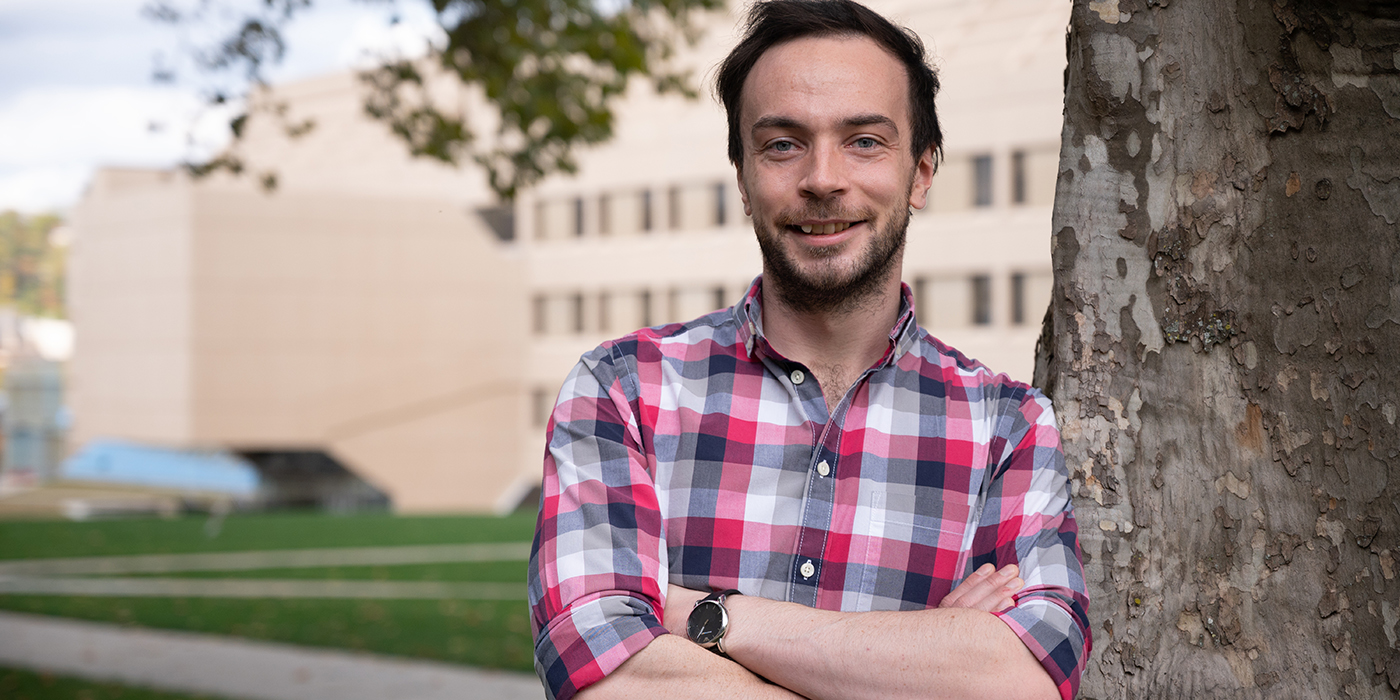
A Familiar Face
Mathematical Sciences Ph.D. graduate Clive Newstead returns to the department as an assistant teaching professor
After Clive Newstead received his Ph.D. in mathematical sciences in 2018 from Carnegie Mellon University, he joined the Department of Mathematics at Northwestern University as a lecturer, teaching courses in multivariable calculus, linear algebra and abstract algebra.
Shortly after, he returned to Carnegie Mellon — this time as a faculty candidate. His visit to campus certainly did not go unnoticed.
Newstead was a bit of a legend among students. Not only had he been a highly respected teaching assistant, winning both the Mellon College of Science’s and university’s Graduate Student Teaching Award, but he also wrote a free textbook, “An Infinite Descent into Pure Mathematics,” that became the main text for two courses in the department.
During his interview, many students attended his job talk and one student even asked him to sign a copy of the front cover.
“A lot of students only know me as the mysterious figure who wrote their textbook, so it was nice to be able to interact with them and show them that I’m a real human being after all,” said Newstead.
This fall, Newstead officially joined the department as an assistant teaching professor. He’s teaching two courses remotely, Concepts of Mathematics — the very course he wrote the textbook for — and Multivariable Calculus and Vector Calculus for Engineers.
Newstead’s research is in category theory and its connections with logic. “I like to think about category theory as the ‘mathematics of mathematics,’” Newstead said of his work. “Whereas mathematics tries to identify patterns and structures in the real world and make sense of them abstractly, category theory does the same thing with mathematics itself.”
A native of Yorkshire, England, Newstead likes cooking hearty British dishes. Outside of research and teaching, he enjoys biking and relaxing with a good dose of reality TV and is in the midst of planning his upcoming wedding.
■ Emily Payne
Center for Nonlinear Analysis Researchers Receive NSF Grant to Study Topological Defects
Researchers from the Department of Mathematical Sciences’ Center for Nonlinear Analysis (CNA) have received a grant from the National Science Foundation to better understand the ubiquitous phenomena associated with topological defects.
The interdisciplinary team will aim to bring together knowledge from the fields of engineering, physics and mathematics to create a unifying framework for describing and understanding topological defects and the phenomena associated with them. These phenomena occur when two uniform patterns of organized matter — from a jet turbine blade to a galaxy — are offset from one another, rotated differently or otherwise have some form of deformation on the surface at which they meet. The crack or curve created where the joining surface ends and the two patterns separate is called a topological defect, and depending on the situation and material, its effect can range from interesting to catastrophic.
“Our team envisions a future where new knowledge from our research can be leveraged to seed advances in technology relevant for grand challenges in seismic forecasting, infrastructure renewal and energy-efficient transportation,” the researchers wrote in their proposal.
Through mathematically defining how topological defects agree and differ within these different materials, scientists and engineers in civil engineering, advanced manufacturing, astronomy, seismology and countless more fundamental fields will have a universal tool for defining one of the most ubiquitous phenomena in our physical world.
The team of researchers is led by Professor of Civil and Environmental Engineering Amit Acharya and includes CNA Director and Kavčić-Moura University Professor of Mathematics Irene Fonseca; Assistant Professor of Mathematical Sciences Franziska Weber; Professor of Physics Ira Rothstein; Emeritus Professor of Physics Bob Suter; Hamerschlag University Professor Emeritus of Civil and Environmental Engineering Jacobo Bielak; Assistant Professor of Civil and Environmental Engineering Jerry Wang; and researchers from the University of Arizona.
■ Dan Carroll
Image of Disclinations and interfaces in a solid (Top to Bottom): Penta-twin, Finite strain stress field of a penta-twin, Stressshielding of penta-twin by dislocations.


